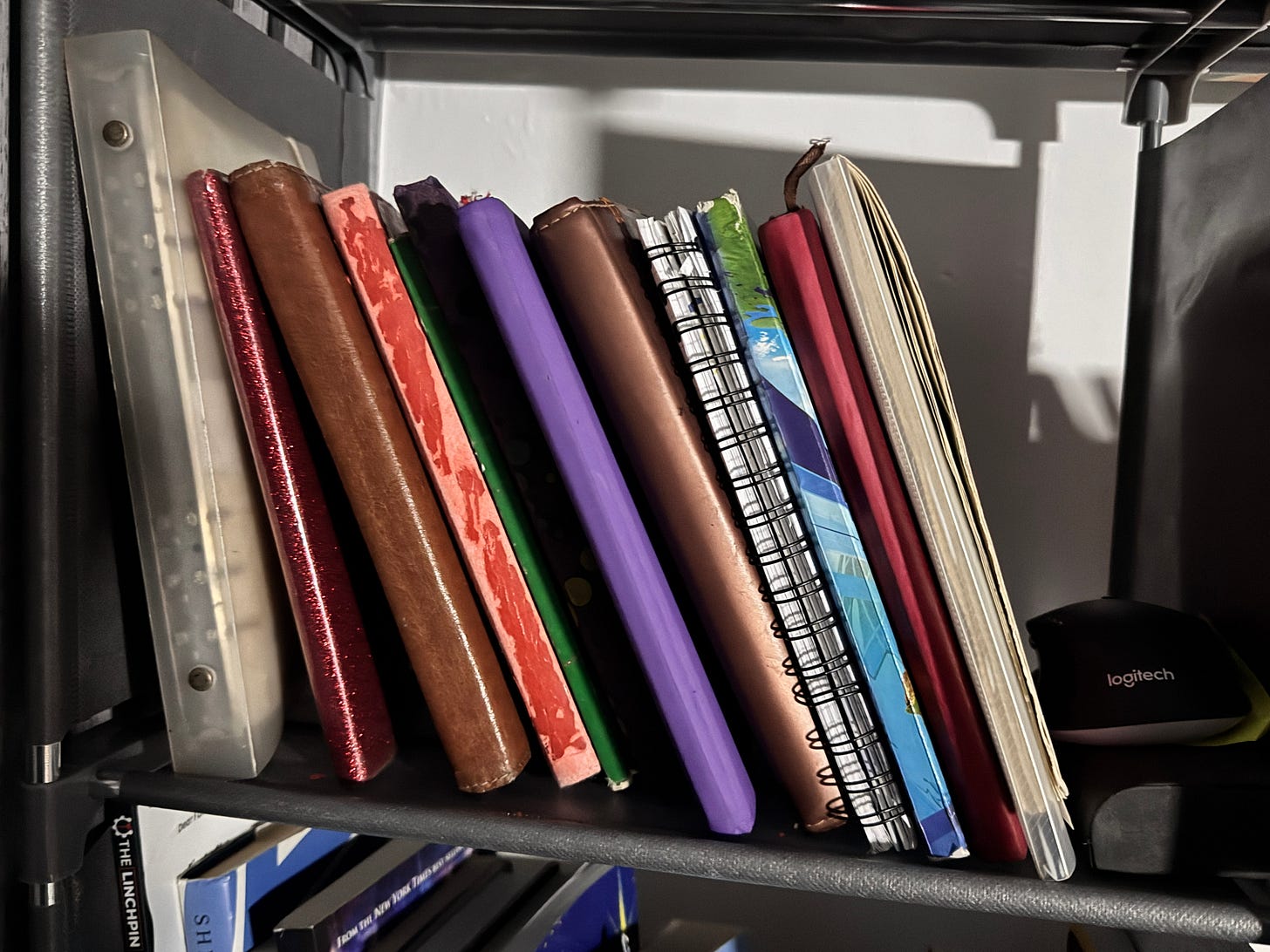The Secret Advantage of Keeping Notes (That Most People Ignore)
How your forgotten notes could be the key to your next big idea
You’re sitting on a goldmine of ideas—but are you using it?
If you’ve ever scribbled thoughts in journals, apps, or sticky notes, you already have a vault of knowledge.
The question is: Are you letting it collect dust, or turning it into something valuable?
For years, I thought I “wasn’t a writer.”
Until 2023.
That’s when I realized something:
I had a decade (and counting) of thoughts tucked away in scribbles, frameworks, random epiphanies, and every intriguing rabbit hole I’ve ever explored.
All that time, I was unknowingly building what I now recognize as a Personal Knowledge Management (PKM) system—without even trying.
And that system was bursting with potential.
Documenting Ideas Can Open Doors You Don’t Even Know Exist
I look at my stack of 10-15-year-old notes, literal shelves of journals (and digital folders), and see a clear record of my evolving mental bandwidth.
Each time I revisit them, I notice how much I’ve grown and how many powerful ideas are just waiting to be shared.
Beyond reliving old memories, my notes help me see patterns: the threads of thought that shape who I am today.
Your notes (whether they’re in a notebook or tucked away in Google Keep like I used to do) hold clues about what really fascinates you.
They also prove how much you’ve learned.
So the next time you question your confidence, authority or experience in a topic, flip through your archives.
It’s all right there.
The Power of Personal Knowledge Management
I think of capturing my ideas like atoms bonding into molecules, then cells, and finally forming complex organisms, just like in biology.
One small idea or insight can connect to another, forming bigger concepts, strategies, or even entire programs or products you can offer.
This is how my ideas have evolved over the years.
I started with tiny notes (atoms): random insight, sparks of ideas, hypothetical frameworks, quick reflection on a YouTube video or article.
Then they combined into bigger thoughts (molecules): short articles, podcast scripts, or workshop outlines.
Over time, entire “organisms” have formed: signature methodologies, product ecosystems, newsletters.
Now I write around 400 words a day.
Most of which you’ll never see.
They’re the raw material for things I eventually do publish, like this newsletter.
Your notes aren’t just a diary. They are intellectual assets.
They can be curated, shared, and monetized if you take the time to connect the dots.
And with AI becoming more accessible, turning these ideas into something tangible has never been easier.
What 2+ Years of Experience Could Mean for You
If you’ve been interested in a subject (or multiple subjects) for 2 years or more, you’ve got a staggering amount of data.
Personal stories, trial-and-error lessons, aha moments, even half-finished experiments.
If you have:
Physical Notes: Gather them up, skim through old notebooks. You’ll be surprised at how many hidden gems are lurking somewhere.
Digital Notes: If you prefer apps like Notion, Obsidian, or Google Keep, consider creating simple structures or tags to help you retrieve knowledge on demand.
Just one year of this kind of obsession can change your life forever.
And when you combine that drive with a clear, organized system of all your brilliant “past obsessions,” you become unstoppable.
A New Generation Is Coming Online
They’re hungry for wisdom but easily swayed by quick-fix mercenaries.
They need genuine leaders and deep thinkers.
They need you—and your well of personal experience.
If you’ve been doing your thing for 2 or more years, you already have a treasure trove in your physical and digital notes.
So the real question isn’t, “Do I have knowledge worth sharing?”
It’s, “How do I organize it so that it becomes wisdom others can benefit from?”
My Battle with Digital Clutter
I’ve tried just about everything.
Notion, Obsidian, Apple Notes, Google Keep—each has been brilliant in its own way.
Yet at one point, I had over 4,000 notes in Notion between January 2023 and April 2024 alone.
Notion brought structure and project management.
Obsidian gave me a “non-directional” playground, letting me break ideas into atomic units, then reassemble them into something fresh. (Exactly how I write these newsletters)
But too much structure can become your worst enemy if you’re not careful.
(I’ll show you exactly how next week when I share Janice’s story—and why her fix saved me from drowning in my own system.)
Your Next Step:
Open your notes right now (journal, Notion, Google Keep—wherever they are).
Pick ONE idea that still excites you.
Expand on it—add a new insight, question, or connection based on your current worldview.
Tweak it.
Let it breathe in a tool like Obsidian or Notion, so it can connect to other thoughts you’ve captured.
You’ll be surprised how these individual “atoms” start building into something bigger. Something that could spark your next product, course, or newsletter.
Reply to this email and tell me: What’s the most exciting note you’ve rediscovered? I’d love to hear.
Next week, I’ll share how my Notion system almost collapsed under its own weight—and the simple shift that saved me. (Hint: It wasn’t just a new tool.)
If you’ve felt buried by digital clutter, you won’t want to miss it.
Until then, remember this:
Your knowledge is more than a scattered set of journals or an overstuffed Google Drive.
It’s the blueprint for someone else’s breakthrough—and quite possibly your own.
Live courageously,
Dayo Samuel 💯




